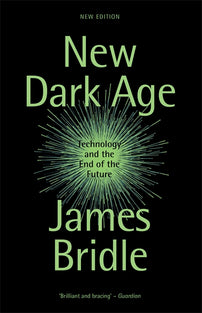What does our digital future look like?
In these videos James Bridle discusses how, despite the apparent accessibility of digital information, we’re living in a new Dark Age.

As the world around us increases in technological complexity, our understanding of it diminishes. Underlying this trend is a single idea: the belief that our existence is understandable through computation, and more data is enough to help us build a better world. But at what cost? And what does it actually mean for our lives?
In these videos James Bridle, leading artist and writer of New Dark Age: Technology and the End of the Future, reveals the dark clouds that gather over our dreams of the digital sublime.
Artificial Intelligence is not neutral
There are cases where software used in justice systems have been racially biased. We need a massive democratisation of technologies:
Imperialism didn’t stop with decolonisation: it just moved up to infrastructure level
Internet fibre optic cables around the world trace out the routes of former empires. Cables from Africa route back to their former colonial powers. Lots of cabling from South America still goes back to Spain:
The world can't be reduced to data: the realities of computational thinking
We face in a future in which we have ever more data about the world but we know less about it:
Conspiracy theories are the most powerful narrative form of our time
Conspiracy theories are a symptom of our new dark age. The last 100 years of computation shows us that big data is always insufficient. We’ve completely undermined any trust in traditional sources of authority but we’ve also spent the last 50 years undercutting our understanding of the world by making technology and the systems around us ever more opaque:
See more:
[book-strip index="1" style="buy"]As the world around us increases in technological complexity, our understanding of it diminishes. Underlying this trend is a single idea: the belief that our existence is understandable through computation, and more data is enough to help us build a better world.
In reality, we are lost in a sea of information, increasingly divided by fundamentalism, simplistic narratives, conspiracy theories, and post-factual politics. Meanwhile, those in power use our lack of understanding to further their own interests. Despite the apparent accessibility of information, we’re living in a new Dark Age.
In his brilliant new work, leading artist and writer James Bridle surveys the history of art, technology, and information systems, and reveals the dark clouds that gather over our dreams of the digital sublime.
